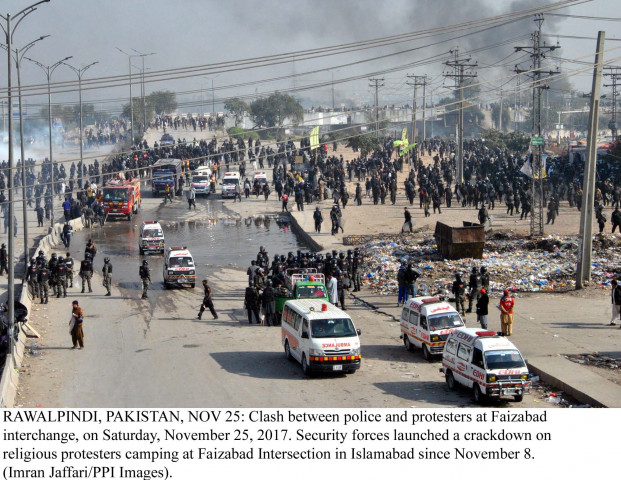Faizabad fiasco: Police reveal why crackdown went awry
Report says well-prepared and equipped protesters got reinforcements

PHOTO: FILE
A divisional bench of the apex court, comprising Justice Mushir Alam and Justice Qazi Faez Isa, will on Thursday resume hearing of a suo motu case on blockade of roads by the protesters. The police admitted that the operation ended without achieving the desired results and the report cites the reasons behind the failure.
Faizabad sit-in: The trail of 21 days
After going through the report, a copy of which is available with The Express Tribune, it becomes obvious that security personnel shared sympathies with the protesters and were reluctant to take action when they were ordered to.
Interestingly, the protesters outmatched law enforcement agencies in preparation as they cut the cables of CCTV cameras installed around the sit-in through which their activities were monitored.
“Police force was fatigued due to prolonged deployment for last many days. Mixed deployment of different forces i.e. FC and Rangers also had negative effects on productivity. Religious sentiments of the men deployed for operation were provoked by the protesters through their speeches, thus making them a hurdle in effective utilisation of men,” says the police report.
Islamabad police said the protesters were so well-prepared to counter the action that they even cut the wires of all security cameras installed around the venue within the jurisdiction of Islamabad and Rawalpindi.
The protesters were “highly religiously motivated” and also armed with pistols, axes, rods, stones, shells and masks, says the report.
According to the report, media channels were doing live coverage of the operation. Social media and cellular networks were also working and announcement of the time of the operation and final deadline to vacate the place went against the police and caused gathering of reinforcements from adjoining areas of Rawalpindi.
Tehreek-e-Labbaik calls off Islamabad sit-in after govt accepts demands
“Initially tear gas and water canon were used but in response the protesters resisted and assaulted the police with batons and axes, while pelting them with stones. They were also armed with tear gas and used it upon police force.”
After hectic efforts of about four hours, almost 80% of the area was cleared of the protesters but in the meantime, workers of the Tehreek-e-Labbaik Ya Rasool Allah (TLYRA) from adjoining areas of Rawalpindi armed with sticks and axes joined them and started brutal attacks on the police. Resultantly, several officials of the police and other law enforcement agencies were injured, according to the report.
“Due to severe resistance by the protesters, there was an apprehension of loss of lives so the operation was stopped for some time and force was reassembled to seal all incoming roads and streets so that another attempt could be made with full preparation,” it says.
In response to the operation, countrywide protests started and all the main roads were blocked. Eventually the operation was postponed, it adds.
Keeping in view the strong resistance by the protesters, a request was made by the Islamabad district administration to the government for requisitioning the army under Article 245 of the Constitution.
“The ministry of interior assigned Rangers the role of clearing Faizabad from protesters, and requisite notification was issued. By midnight of November 26-27, the issue between the leadership of TLYRA and the government was settled through negotiations and the protesters announced winding up of their sit-in,” says the report.
The report reveals that 27 cases were registered between Nov 8 and 25 against 418 protesters who were sent in judicial custody after investigation, and challans against the culprits are being sent to the relevant courts for trial.
Centre’s solo flight blamed for sit-in debacle
Under a security plan, as many as 5,508 personnel, with anti-riot equipment, were deployed for the operation at Faizabad Interchange. At least 173 personnel were injured by the protesters. Neither any government employee nor any other person died during the operation as no firearms were issued to any officer deployed on duty, according to the report.
“The operation was carried out with proper preparation but due to the strong resistance by the protesters and reinforcements by the workers of TLYRA from nearby areas of Rawalpindi and Islamabad, the operation was stopped temporarily to avoid any causality. But upon receipt of information by the competent authority that the countrywide protests had started and problems were occurring in maintaining law & order throughout the country, the operation was stopped as in the developing situation, the government decided to resolve the issue through negotiations in the best interest of the country. The negotiations were started at the highest level and by the midnight of 26/27.11.2017, the issue between leadership of TLYRA and the government was settled.”



















COMMENTS
Comments are moderated and generally will be posted if they are on-topic and not abusive.
For more information, please see our Comments FAQ